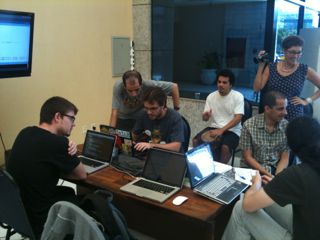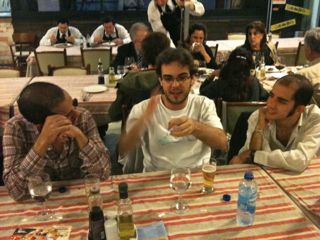 Which is the oldest human record?
Which is the oldest human record?
In his keynote presentation to the National Symposium of Brazilian Cyberculture, Jon Ippolito argues it is lurking in the Amazon rainforest.
Brazil is a country on the move, with a vibrant culture that John Perry Barlow claims has leapfrogged the industrial revolution and gone straight to an information economy.
Yet its contribution to the future of new media may derive not just from its current digital initiatives but also from its indigenous heritage.

Drawing from the forthcoming book New Media and Social Memory, co-authored with Richard Rinehart, Ippolito’s talk Trusting Amateurs with Our Future focuses on “unofficial” uses of new media, especially by the young, and why they are sometimes more effective than professional enterprises.
The mapinguary, for example, is a 10,000-year-old beast kept alive only in the repeated stories of Indians of the Amazon; as a historical record, it dates back much further than stone artifacts such as the Rosetta Stone or Gudea cylinders.
 The Fifth National Symposium of the Brazilian Association of Cyberculture Researchers was organized by Yara Guasque of ABCiber from 15-19 November in Florianopolis, which has been called “Silicon Valley with beaches.” The conference includes an exhibition of works by artists like Sonia Guggisberg and workshops by LaboCA (Filipe Calegario, Ricardo Brazileiro, Jeraman and Jarbas Jácome).
The Fifth National Symposium of the Brazilian Association of Cyberculture Researchers was organized by Yara Guasque of ABCiber from 15-19 November in Florianopolis, which has been called “Silicon Valley with beaches.” The conference includes an exhibition of works by artists like Sonia Guggisberg and workshops by LaboCA (Filipe Calegario, Ricardo Brazileiro, Jeraman and Jarbas Jácome).
 Polish curator Joasia Krysa reaches back into mid-20th century computational culture to ask whether machines can curate, while Enrique Rivera revisits in virtual form the CyberSyn collaboration from the 1970s, whereby British engineers helped the Chile’s Allende socialist administration envision a utopian model of techno-governance.
Polish curator Joasia Krysa reaches back into mid-20th century computational culture to ask whether machines can curate, while Enrique Rivera revisits in virtual form the CyberSyn collaboration from the 1970s, whereby British engineers helped the Chile’s Allende socialist administration envision a utopian model of techno-governance.
Shown: LaboCA: Laboratório de Computação e Artes de Recife.
This travel was sponsored by the Brazilian Association of Cyberculture Researchers, with additional support by the New Media Department and College of Liberal Arts and Sciences of the University of Maine.
